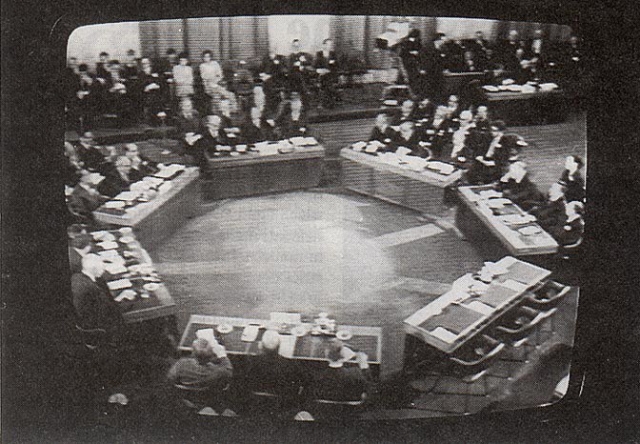On December 21, 1973, the week-long Geneva Conference began. The conference that came towards the end of the Israeli Yom Kippur war with Egypt and Syria, attempted to solve the Israeli-Arab conflict in a peaceful manner. Representatives from the US, Soviet Union, Great Britain, and the early European Union mediated between Israeli and various Arab diplomats. Although the conference ultimately didn’t resolve the entire conflict, it is commonly credited as the starting point for Israeli-Egyptian peace.
The Geneva Conference was arranged and officially a co-chairmanship between the United States and the Soviet Union, However, likely due to Cold War diplomacy along with Soviet-Arab weapons deals, it is believed Secretary of State Henry Kissinger kept the Soviet Union virtually completely uninformed about the progress being made between Israel and Egypt for a future disengagement agreement and eventual peace agreement.
While attempts to revive the conference in the mid-1970s failed, the talks it sparked led to the signing of the Sinai II Agreement between Egypt and Israel on 4 Sep 1975 in Geneva that saw further withdrawal of Israeli forces in the Sinai. pic.twitter.com/RowvfevcnL
— 🦐 (@AhamadNooh) October 17, 2020
At the time relations between the new Soviet-sponsored militant group, the Palestine Liberation Organization and Israel were far more hostile than today. The PLO refused to recognize Israel’s sovereignty, and as a result, Israel decided to not allow them to attend the conference. The Syrian government, as an act of protest to the Israeli decision, decided to not attend the diplomatic meetings as well.
When it comes to Middle East mediation summits hosted by the Soviet and American governments, it is important to keep the Cold War in mind. Often, the two superpowers would abuse their powers as mediators to gain strategic and diplomatic leverage over each other. That is why President Sadaat of Egypt refused any real negotiations at the conference and perceived it strictly as a diplomatic, PR stunt. Nevertheless, the Geneva Conference marked the last time that Soviet and US powers worked together as co-partners on any Middle Eastern diplomatic missions.
The Soviets, concerned about the West gaining a foothold in the Middle East helped establish and fund what would become the PLO. The idea was to destabilize Israel from the inside by stoking nationalist sentiments among Israel's Arab population. This was the start of what would become the movement to 'Free Palestine' and among the first times in history that Arabs in the southern Levant ever called themselves Palestinians.
In 1977, when US President Carter attempted to renew the conference, both Egypt and Israel refused to participate on the grounds of keeping peace negotiations private. Jordan also participated in the Geneva Conference, however, like their Egyptian counterparts, they preferred to not negotiate on such a public platform.
1937 Peel Commission
— Likud-Herut UK (@LikudUK) December 21, 2018
1939 British White Paper
1947 UN offer
1949 Armistice Agreement 1967 Allon Plan
1969 Rogers Plan
1973 Geneva Conference
1978 Camp David Accords
1991 Madrid Conference
1993 Oslo Agreements
1994 Jordan Treaty
2000 Barak offer
2008 Olmert offer. 1/2 pic.twitter.com/oOqSNy6N1V
The Sinai Interim Agreement between Israel and Egypt is a direct result of the conference and was signed in geneva as well just 2 years later. The interim agreement on top of noting Israel’s willingness to return the Sinai peninsula to Egypt stated the two countries' conflicts “shall not be resolved by military force but by peaceful means."


